As supporters of Ipswich, we are familiar with the lows that come with the territory. Unfortunately, these downs seem to be a recurring pattern lately. This is why we tend to savor our moments of triumph longer than fans of other clubs (with the exception of Liverpool, whose supporters seem stuck in the past). Some might claim that winning the league championship only 17 seasons after turning professional was our greatest victory. However, since I wasn’t alive back then, I’ll have to settle for celebrating the club’s second biggest achievement.
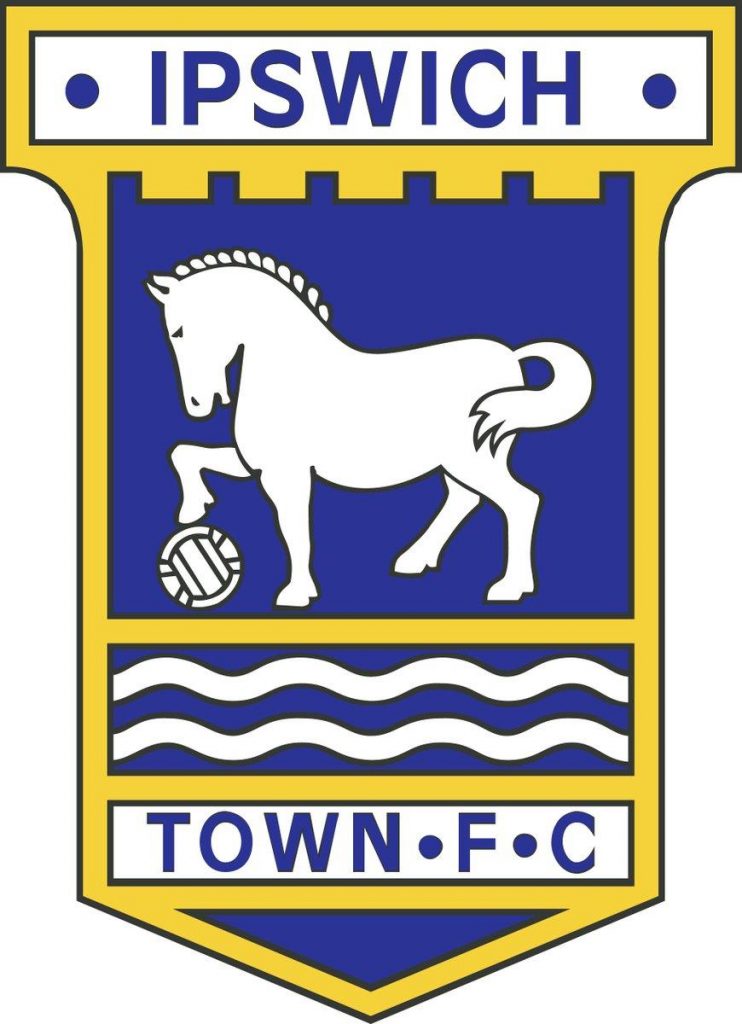
Much has been documented regarding the triumph in the UEFA cup, the second place finish in the league, and the FA cup journey. However, the focus of this piece is on the dissolution of the remarkable team and the financial transactions associated with the 11 players who participated in both legs of the UEFA cup final, as well as their eventual replacements.
To jog your memories the 11 players I will be focusing on are:-
1 – Paul Cooper
2 – Steve McCall
3 – Mick Mills
4 – Frans Thijssen
5 – Russell Osman
6 – Terry Butcher
7 – John Wark
8 – Arnold Murhen
9 – Paul Mariner
10 – Alan Brazil
11 – Eric Gates
They also bowed out of the FA cup in the last 16 round against Shrewsbury. In the same year, five members of the ’81 team (Mills, Butcher, Wark, Mariner, and Brazil) along with George Burley were selected to participate in the 1982 world cup. Unfortunately, Muhren and Thijssen did not make it as Holland failed to qualify.
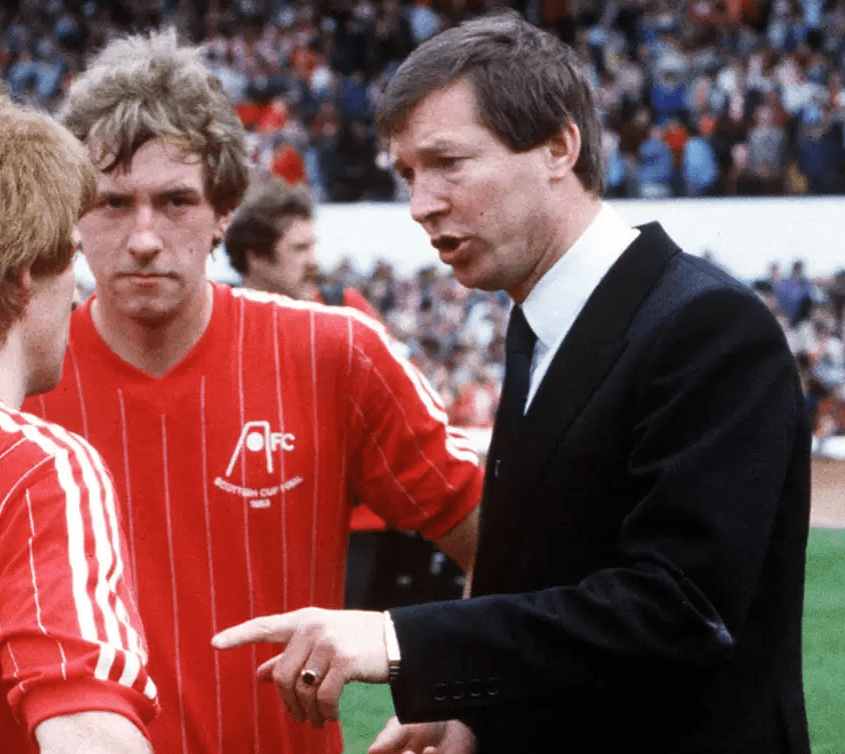
Despite being overshadowed by the previous amazing season, the following season was also commendable. The team finished as runners-up in the league again, trailing behind Liverpool, and made it to the two-legged semi-final of the league cup against the same team. However, their journey in the UEFA cup was cut short after a disappointing first-round exit against Alex Ferguson’s Aberdeen.
The reason behind Ipswich’s potential downfall could have been England’s inability to defeat West Germany or Spain in the second round, leading to their elimination. It’s possible that if England had emerged victorious and won the championship, they may not have required a new manager. Alternatively, if the FA had appointed Cloughie as the manager, things could have turned out differently.
No matter how you view it, the man who made the town made a poor decision (in my opinion). Despite being offered a 10-year contract by the Cobbold family, he was lured away by the prospect of coaching the England team. As one of his final acts as the town’s manager, he had to inform club captain Mick Mills – who held the record for most appearances – that he would not be receiving a new contract. Mills was quickly signed by Southampton and became a key player in Lawrie McMenemy’s team of former England captains. In exchange for Mills, Town received a sum of £40,000 from Southampton.
Shortly after Millsy dashed down the south coast, Arnold Muhren departed for Old Trafford, lured by Big Ron, and spent three years with Manchester United. The most unjust aspect of this decision, along with FT’s departure six months later, was that the town did not receive any money for the transfer. Frans quickly followed suit and left for Nottingham Forest after his close friend’s exit. Consequently, the captain and two of the most exceptional Dutch imports ever were gone in a matter of months.
Alan Brazil left next, heading to North London to join Spurs. Fortunately, we received a decent amount of money this time around, precisely £425,000. However, in my opinion, the two most significant losses occurred in 1984 when John Wark and Paul Mariner departed. Warky went to Liverpool for £450,000 (but he would return multiple times), while PM chose Arsenal for a paltry sum of £150,000.
Within three years, more than half of the great 11 had departed and within two additional years, all of them would be gone. Osman and Gates left in 1985, with Osman transferring to Leicester for £270,000 and Gatesy joining Sunderland, his childhood team, for £150,000.
In May 1986, Ipswich was relegated from the top flight. When they returned to the 2nd tier of English football, Terry Butcher moved to Glasgow Rangers for £725,000. Paul Cooper joined Leicester for free the following season, and Steve McCall left for Sheffield Wednesday for £300,000, making him the last of the 11 departures.
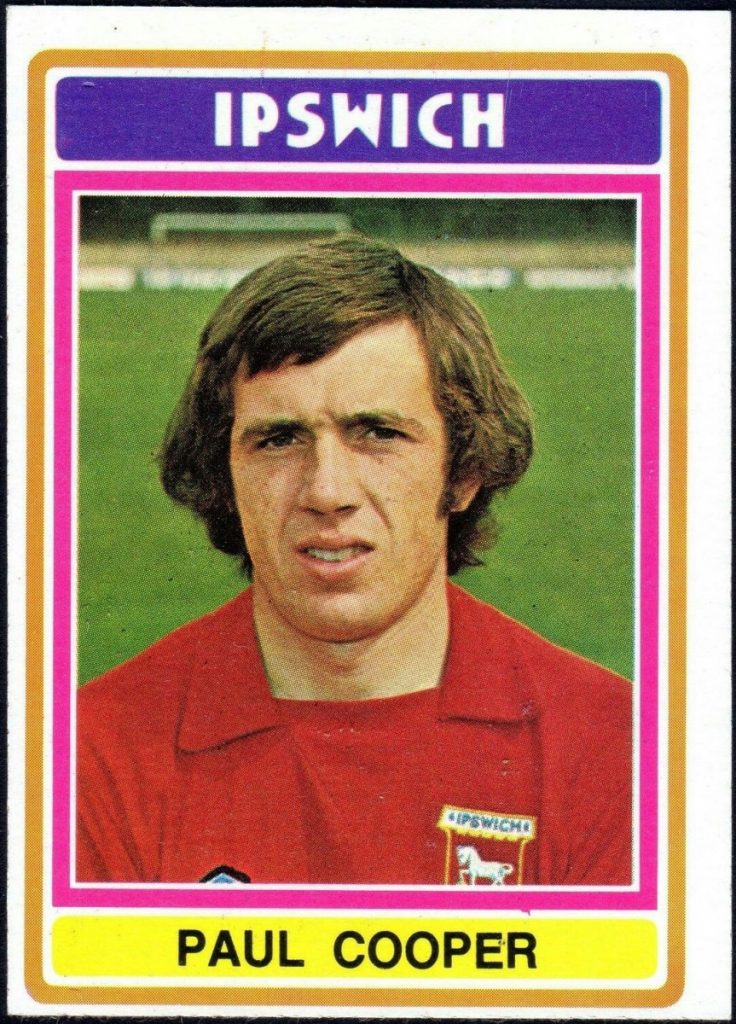
So they’d all gone for the combined fee of £2,510,000 which inflated to 2018 prices equates to £7,510,585.
Who did we replace them with? The following is pure speculation and lacks scientific evidence. I relied on the assumption that the player who took the place of the departed player for an extended duration was the next in line. In some cases, these players were not direct replacements as they had already been part of the team and had played for the first team. I included this information as a reference to illustrate the transformation of ITFC from what it was to what it is now.
Paul Cooper > Jon Hallworth
Steve MCall > Frank Yallop
Mick Mills > David Barnes
Frans Thijssen > Romeo Zondervan
Russell Osman > Ian Cranson
Terry Butcher > Tony Humes
John Wark > Trevor Putney
Arnold Muhren > Mark Brennan
Paul Mariner > Alan Sunderland
Alan Brazil > Mich d’Avray
Eric Gates > Kevin Wilson
6 of the replacements came through the Ipswich youth system, 4 more on frees from other clubs and 1, Kevin Wilson, cost £150,000.
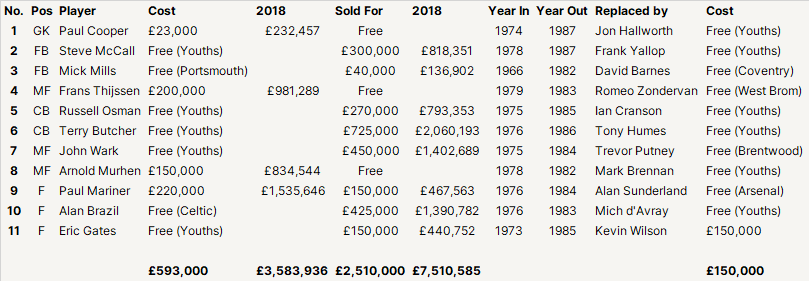
There’s no shortage of reasons to debate over a few pints regarding the decline of Ipswich after the late 70s and early 80s heydays. To start, the departure of the team’s mastermind certainly played a role. Additionally, the board decided to prioritise stadium upgrades over strengthening/rebuilding the squad, a couple of players got too big for their britches and demanded exorbitant salaries (namely, Wark and Mariner), and replacing Robson with the likable but ultimately unqualified Bobby Ferguson was not the most astute decision.
Although I bestowed upon him the title of master, can Bobby Robson be held somewhat accountable? While he assembled an impressive team, was the remainder of the squad up to par? Beyond the 11 players mentioned, who else was available? Much is made of Robson only signing 14 players throughout his tenure. Maybe that is another reason. We didn’t have strength in depth. Though George Burley and Kevin O’Callaghan were both talented players, what other options did we have in 1981 and 1982?
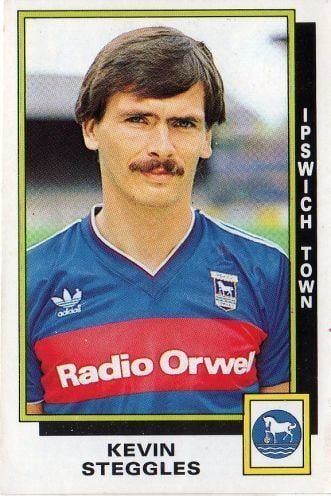
The aging trio of Osborne, Hunter, and Beattie can be overlooked as they were approaching the end of their illustrious careers. This leaves us with Kevin Steggles, Robin Turner, Irvin Gernon, and Tony Kinsella who were not on the same level as the rest of the team. As an aside Steggles played 50 games for Ipswich and is a genuinely nice bloke.
Although there are numerous theories and speculations, it cannot be denied that a small, unfashionable club from tranquil Suffolk had the audacity to compete with the big boys and briefly became the best team in the world.
Although our history isn’t as great as a lot of football clubs its a history our nearest rivals could only dream of having.
Disclaimer:- Some of the timeline and transfer fees in this article may actually be different to real life. Please feel free to correct any glaring mistakes.
I hope you’ve enjoyed one of the most meaningless pieces I’ve ever written. I certainly did
Verso